-
 Bitcoin
Bitcoin $79,817.2968
-3.76% -
 Ethereum
Ethereum $1,637.4916
-8.53% -
 Tether USDt
Tether USDt $0.9994
-0.02% -
 XRP
XRP $2.0045
-5.99% -
 BNB
BNB $558.8408
-5.68% -
 USDC
USDC $0.9998
-0.01% -
 Solana
Solana $108.2855
-8.48% -
 Dogecoin
Dogecoin $0.1543
-8.30% -
 TRON
TRON $0.2339
-1.59% -
 Cardano
Cardano $0.5959
-8.50% -
 UNUS SED LEO
UNUS SED LEO $8.9343
-1.54% -
 Toncoin
Toncoin $3.1618
-4.96% -
 Chainlink
Chainlink $11.5857
-8.61% -
 Stellar
Stellar $0.2438
-2.62% -
 Avalanche
Avalanche $16.3204
-8.79% -
 Shiba Inu
Shiba Inu $0.0...01140
-6.76% -
 Sui
Sui $1.9800
-10.62% -
 Hedera
Hedera $0.1437
-10.85% -
 Polkadot
Polkadot $3.7262
-5.33% -
 MANTRA
MANTRA $5.9692
-5.00% -
 Litecoin
Litecoin $73.8289
-10.22% -
 Bitcoin Cash
Bitcoin Cash $280.6233
-6.07% -
 Dai
Dai $0.9999
-0.02% -
 Ethena USDe
Ethena USDe $0.9987
-0.03% -
 Bitget Token
Bitget Token $4.2015
-5.30% -
 Pi
Pi $0.6090
2.64% -
 Monero
Monero $202.3582
-5.96% -
 Hyperliquid
Hyperliquid $10.4627
-10.81% -
 Uniswap
Uniswap $5.2256
-9.94% -
 OKB
OKB $49.5006
-3.88%
How do NFT trading platforms deal with market fluctuations and speculation?
NFT platforms mitigate market volatility through robust security, transparent fees, diverse offerings, and user education, focusing on informed decision-making rather than speculation suppression, while adhering to legal and regulatory compliance to protect users and the platform's stability.
Mar 06, 2025 at 04:01 pm
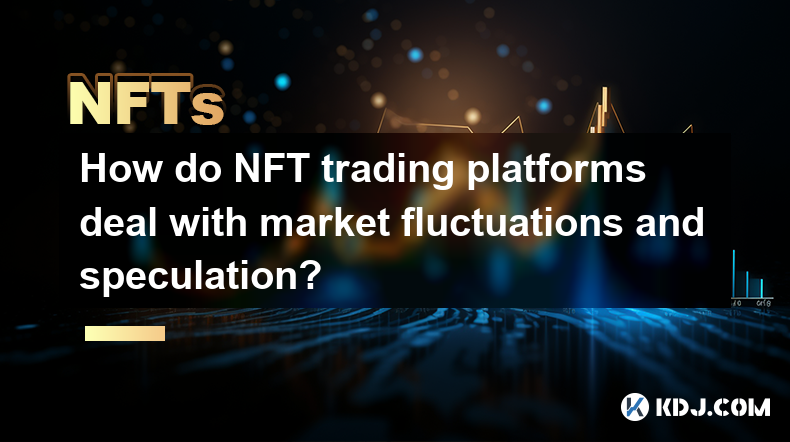
Key Points:
- NFT trading platforms utilize various strategies to mitigate the impact of market volatility on their operations and user experience.
- Speculation is inherent to the NFT market; platforms focus on providing tools and information to help users make informed decisions, rather than suppressing it entirely.
- Risk management strategies employed by platforms include robust security measures, transparent fee structures, and diverse offerings to reduce dependence on any single NFT collection.
- Legal and regulatory compliance is a key aspect of managing market fluctuations and speculation, protecting both the platform and its users.
- Community building and education are crucial for fostering a healthier and more informed NFT market.
How do NFT trading platforms deal with market fluctuations and speculation?
The cryptocurrency market, including the NFT sector, is notoriously volatile. NFT trading platforms face the challenge of navigating these wild swings while maintaining a stable and functional marketplace. They employ a range of strategies to address both market fluctuations and the inherent speculation within the NFT ecosystem.
One primary approach is risk mitigation. Platforms invest heavily in robust security measures to protect against hacks and theft, a significant concern given the high value of some NFTs. This includes advanced encryption, multi-signature wallets, and regular security audits. A transparent and clearly defined fee structure is also crucial for building trust and managing expectations during periods of market uncertainty.
Market fluctuations directly impact trading volume and platform revenue. To counteract this, many platforms diversify their offerings beyond just NFT trading. This might include integrating features like fractional NFT ownership, lending and borrowing protocols, or even incorporating other crypto assets into their ecosystem. This reduces reliance on the performance of a single NFT collection or market segment.
The inherent speculative nature of the NFT market is a double-edged sword. While speculation can drive significant growth, it also increases the risk of bubbles and crashes. Platforms acknowledge this and generally don't try to suppress speculation entirely. Instead, they concentrate on providing tools and resources to help users make more informed decisions. This could include market data analysis, educational resources on NFT valuation, and community forums where users can share insights and discuss potential risks.
Legal and regulatory compliance is paramount. Platforms must adhere to evolving laws and regulations regarding cryptocurrency and digital assets. This not only protects the platform itself from legal challenges but also safeguards users' investments and personal data. The regulatory landscape is constantly changing, so staying updated and proactive is crucial.
Furthermore, many platforms are actively involved in community building and education. They recognize that a healthy and informed community is less susceptible to manipulation and market panic. This involves organizing educational workshops, creating detailed documentation, and fostering open communication with users.
How do platforms manage the risk of a sudden market crash impacting their operations?
Platforms employ several strategies to mitigate the impact of a market crash. These include diversifying revenue streams, maintaining a reserve fund, and having robust risk management models in place. They also focus on building a loyal user base, offering valuable features and tools even during downturns.
How do NFT platforms deal with wash trading and other manipulative activities?
Platforms implement various anti-fraud measures, including sophisticated algorithms to detect unusual trading patterns and collaboration with blockchain analytics firms. They also often have human moderators reviewing transactions to identify suspicious activities. Transparency and clear reporting are crucial for deterring and addressing manipulative practices.
What role does insurance play in protecting users and platforms during market volatility?
While not yet widespread, some platforms are exploring insurance solutions to cover losses due to hacks, scams, or market crashes. This offers an added layer of protection for users and can help maintain trust in the platform during turbulent periods.
How do platforms ensure the authenticity of NFTs traded on their platforms?
Platforms usually leverage blockchain technology's inherent immutability to verify NFT authenticity. They also often collaborate with creators and artists to verify the provenance of NFTs and prevent counterfeit copies from entering the marketplace.
What strategies do NFT platforms use to attract and retain users during market downturns?
Retention strategies include offering improved user experiences, enhancing platform functionality, and creating engaging community events. Platforms may also introduce new features, offer discounts or promotions, and continue to invest in marketing and community building efforts to attract new users.
What legal and regulatory challenges do NFT platforms face in relation to market fluctuations and speculation?
Platforms face a complex web of legal and regulatory issues, including those related to securities laws, anti-money laundering regulations, consumer protection laws, and taxation. The constantly evolving regulatory landscape necessitates continuous adaptation and compliance efforts.
How do NFT platforms balance the need for innovation with the need for regulatory compliance?
This is an ongoing challenge. Platforms strive for innovation by incorporating new technologies and features while meticulously ensuring their operations comply with relevant laws and regulations. They often engage legal experts and actively participate in industry discussions to shape the regulatory framework.
What ethical considerations are involved in how NFT platforms deal with market fluctuations and speculation?
Ethical considerations include transparency in fees and operations, fair treatment of users, responsible marketing practices, and avoiding actions that could exacerbate market volatility or manipulate users. Platforms must prioritize the long-term health of the ecosystem over short-term gains.
Disclaimer:info@kdj.com
The information provided is not trading advice. kdj.com does not assume any responsibility for any investments made based on the information provided in this article. Cryptocurrencies are highly volatile and it is highly recommended that you invest with caution after thorough research!
If you believe that the content used on this website infringes your copyright, please contact us immediately (info@kdj.com) and we will delete it promptly.
- Mutuum Finance (MUTM) Is Building the Infrastructure to Appeal to Both Everyday Users and Experienced DeFi Participants
- 2025-04-07 02:30:12
- As cryptocurrencies become a strategic reserve for the United States under Trump’s promotion, investors are eager to find the best way to maximize their investments
- 2025-04-07 02:30:12
- TRON founder Justin Sun intensifies his accusations against First Digital Trust (FDT)
- 2025-04-07 02:25:12
- title: Conor McGregor Launches REAL Meme Coin with Voting Rights and Staking Rewards
- 2025-04-07 02:25:12
- Ethereum's Price Has Fallen Below Significant Support Levels
- 2025-04-07 02:20:12
- Investors Evaluating Dogecoin Must Acknowledge the Risks
- 2025-04-07 02:20:12
Related knowledge
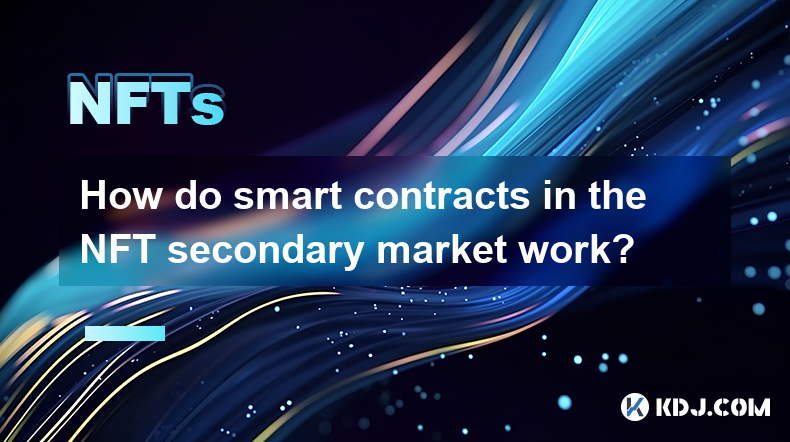
How do smart contracts in the NFT secondary market work?
Apr 03,2025 at 07:14am
Smart contracts play a pivotal role in the NFT secondary market, facilitating seamless transactions and enforcing predefined rules. These self-executing contracts with the terms of the agreement directly written into code are stored on the blockchain. In the context of NFTs, smart contracts automate the buying, selling, and transferring of digital asset...
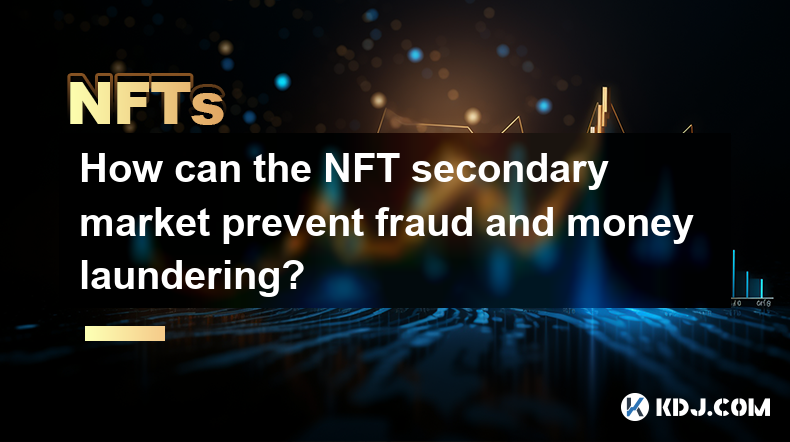
How can the NFT secondary market prevent fraud and money laundering?
Apr 03,2025 at 08:35am
The NFT secondary market has become a thriving hub for digital art and collectibles, but it also faces challenges in preventing fraud and money laundering. To tackle these issues, the market can implement various strategies and technologies to ensure a safer and more transparent trading environment. This article will explore how the NFT secondary market...
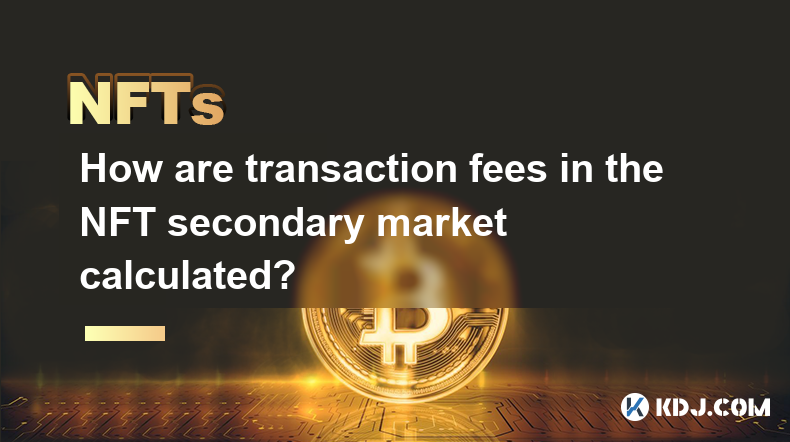
How are transaction fees in the NFT secondary market calculated?
Apr 04,2025 at 05:28am
The calculation of transaction fees in the NFT secondary market is a crucial aspect that both buyers and sellers need to understand. These fees can significantly impact the overall cost of transactions and the profits that sellers can make. In this article, we will delve into the various components that make up these fees, how they are calculated, and w...
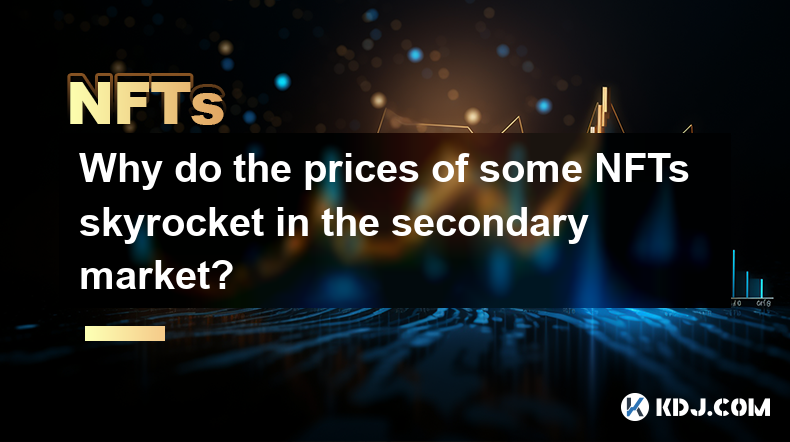
Why do the prices of some NFTs skyrocket in the secondary market?
Apr 06,2025 at 07:08am
The phenomenon of NFT prices skyrocketing in the secondary market is a fascinating aspect of the cryptocurrency and digital art world. Non-Fungible Tokens (NFTs) have taken the digital world by storm, and their value can surge dramatically after initial sales. Several factors contribute to this price surge, including rarity, demand, speculation, and the...
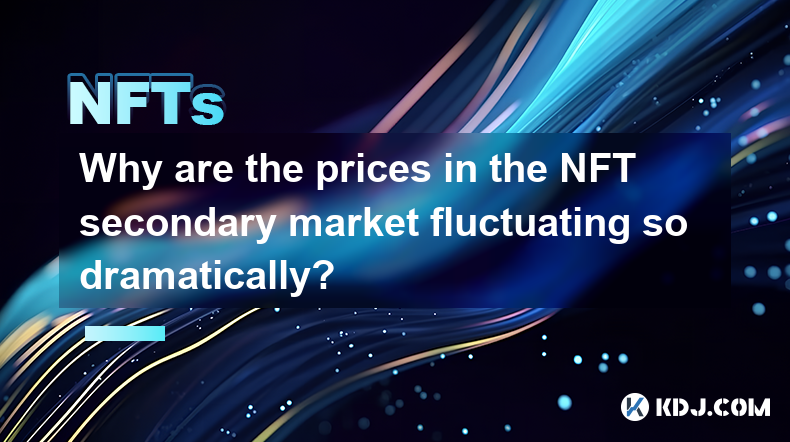
Why are the prices in the NFT secondary market fluctuating so dramatically?
Apr 03,2025 at 10:35pm
The NFT secondary market has been experiencing dramatic price fluctuations, leaving many in the cryptocurrency community puzzled and curious. To understand this phenomenon, it's essential to delve into the factors driving these price movements. From the impact of market sentiment and celebrity endorsements to the role of speculation and the unique natur...
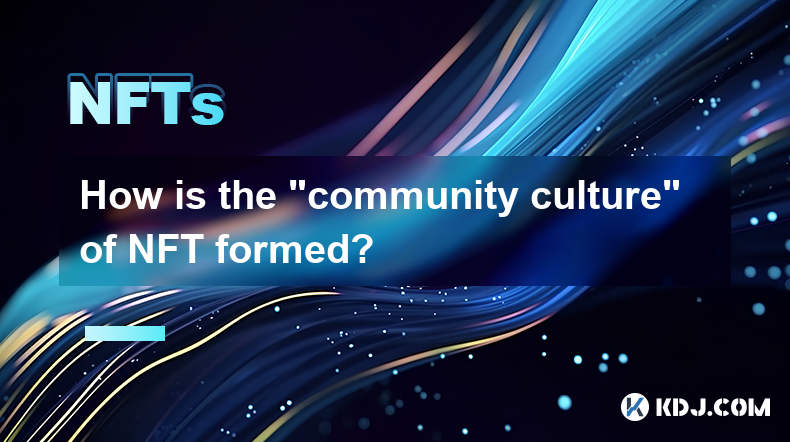
How is the “community culture” of NFT formed?
Apr 03,2025 at 11:07am
The formation of the 'community culture' within the NFT (Non-Fungible Token) space is a fascinating and multi-faceted process. It involves various elements such as shared interests, active engagement, and the creation of a sense of belonging among members. NFT communities often revolve around specific projects or artists, fostering a unique environment ...

How do smart contracts in the NFT secondary market work?
Apr 03,2025 at 07:14am
Smart contracts play a pivotal role in the NFT secondary market, facilitating seamless transactions and enforcing predefined rules. These self-executing contracts with the terms of the agreement directly written into code are stored on the blockchain. In the context of NFTs, smart contracts automate the buying, selling, and transferring of digital asset...

How can the NFT secondary market prevent fraud and money laundering?
Apr 03,2025 at 08:35am
The NFT secondary market has become a thriving hub for digital art and collectibles, but it also faces challenges in preventing fraud and money laundering. To tackle these issues, the market can implement various strategies and technologies to ensure a safer and more transparent trading environment. This article will explore how the NFT secondary market...

How are transaction fees in the NFT secondary market calculated?
Apr 04,2025 at 05:28am
The calculation of transaction fees in the NFT secondary market is a crucial aspect that both buyers and sellers need to understand. These fees can significantly impact the overall cost of transactions and the profits that sellers can make. In this article, we will delve into the various components that make up these fees, how they are calculated, and w...

Why do the prices of some NFTs skyrocket in the secondary market?
Apr 06,2025 at 07:08am
The phenomenon of NFT prices skyrocketing in the secondary market is a fascinating aspect of the cryptocurrency and digital art world. Non-Fungible Tokens (NFTs) have taken the digital world by storm, and their value can surge dramatically after initial sales. Several factors contribute to this price surge, including rarity, demand, speculation, and the...

Why are the prices in the NFT secondary market fluctuating so dramatically?
Apr 03,2025 at 10:35pm
The NFT secondary market has been experiencing dramatic price fluctuations, leaving many in the cryptocurrency community puzzled and curious. To understand this phenomenon, it's essential to delve into the factors driving these price movements. From the impact of market sentiment and celebrity endorsements to the role of speculation and the unique natur...

How is the “community culture” of NFT formed?
Apr 03,2025 at 11:07am
The formation of the 'community culture' within the NFT (Non-Fungible Token) space is a fascinating and multi-faceted process. It involves various elements such as shared interests, active engagement, and the creation of a sense of belonging among members. NFT communities often revolve around specific projects or artists, fostering a unique environment ...
See all articles





















































































